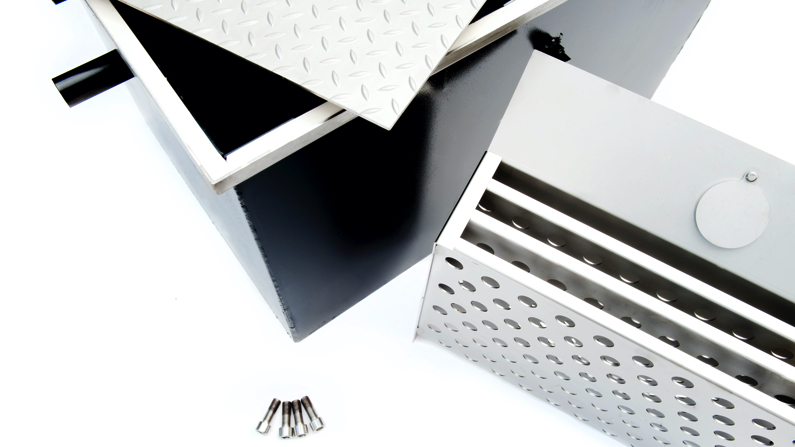Why Do We Need Grease Traps?
Grease traps are important because they do exactly what they suggest, trap the fats, oils, and grease from your cooking. If these materials go down your drain, they can clog your pipes and your sewer line. If these pipes get clogged, they can cause flooding which will lead to expensive repairs and health hazards.
How Do They Work?
Grease traps function by catching fats, oils, and grease, while separating them from wastewater and solid food. The wastewater goes through restaurants’ sinks and dishwashers and into the grease trap. The grease trap container captures wastewater that goes through the sinks and acts as a reservoir. As the wastewater cools, fats, oils, and grease harden. The grease are lighter than water and float on top. Wastewater is then forced through the crossover pipe while the greases and solid foods remain in the container.
After the majority of solids have been removed, the water flows through the crossover pipe. This pipe provides the wastewater with a secondary filtration, removing the majority of the solids from the water. Once the wastewater is filtered through the crossover pipe, it can travel to the outgoing line. The outgoing line is responsible for dispelling filtered water into the sewer system. It is designed to allow the grease trap to maintain its liquid level. A proper liquid level is essential to ensuring that the grease trap continues to separate solid foods, grease, and water.
How Often Should My Grease Trap be Pumped?
Your grease trap container will hold grease and solid foods that will build up over time. For this reason, it’s important to regularly pump your grease trap to remove this sludge. In order to ensure proper functioning, you should pump your trap when the food and grease takes up 22% of the trap. There are multiple factors that will impact the frequency at which your grease trap needs to be pumped.
Size of the Trap
If you have a very large grease trap, it might need to be cleaned less often because it will take longer to fill. The size of the trap will affect the frequency at which you need to clean your grease trap.
Amount of Food
The amount of food prepared in your kitchen will impact your cleaning schedule as well. During a busy period or season, you’ll need to clean your grease trap more often to keep up with the grease buildup.
Type of Food
The type of food cooked in your kitchen can contribute to a more or less frequent pumping schedule. If your restaurant cooks greasier food frequently, it will probably need to be pumped more frequently.
Cleaning Practices
When you scrape dishes before you wash them, you will keep extra food and grease out of the drain, decreasing the frequency at which your grease trap will need to be cleaned. You should also avoid pouring higher fat liquids, such as fryer oil, down the drain when possible.
Putting your grease trap on a Service Level Agreement is the best way to ensure that your grease trap is cleaned regularly, compliant with local authority regulations and is working to its full potential. Contact us for more information. A SERVICE LEVEL AGREEMENT..HOW TAYLORMADE CAN HELP

